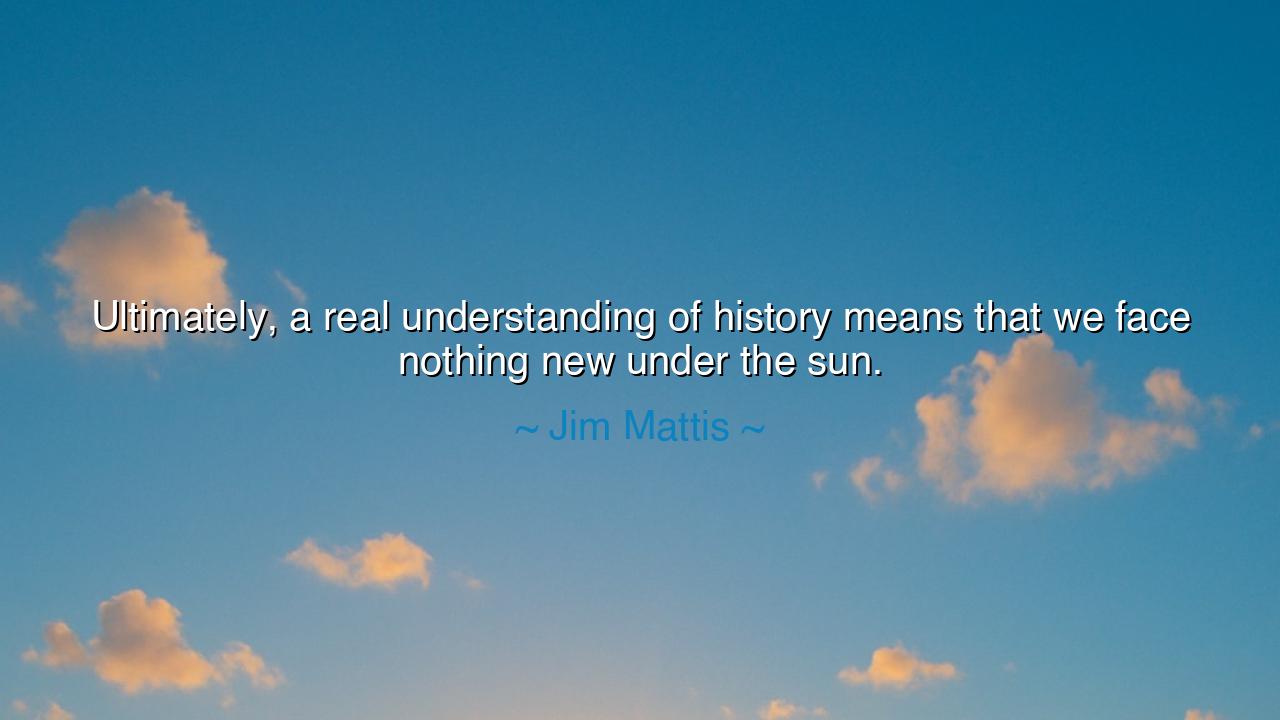
Ultimately, a real understanding of history means that we face
Ultimately, a real understanding of history means that we face nothing new under the sun.






When Jim Mattis, the soldier-scholar and warrior of discipline, declared, “Ultimately, a real understanding of history means that we face nothing new under the sun,” he spoke with the timeless wisdom of one who has seen the cycles of conflict, ambition, and folly that shape the human story. His words echo an ancient truth first whispered in Ecclesiastes, that there is indeed “nothing new under the sun” — that the struggles of men and nations repeat themselves like the turning of seasons. In this saying, Mattis calls us to humility, to recognize that the dilemmas we face, no matter how modern in form, are rooted in the same passions, fears, and hopes that have guided humanity since its dawn.
The origin of this quote can be found in Mattis’s lifelong devotion to the study of history and warfare. Known as the “Warrior Monk” for his love of books and reflection, Mattis saw in history not a collection of dusty facts, but a living guide — a compass for the wise. He believed that those who study the past gain foresight, for they see patterns where others see chaos. Whether in the march of armies or the rise of empires, he observed that the same forces—greed, pride, courage, fear, faith, and folly—reappear across the centuries. To “face nothing new” is not to claim that progress is meaningless, but to understand that the human heart remains unchanged, and that wisdom lies in learning from those who walked before.
Mattis spoke often of how the unprepared leader, ignorant of history, walks blind into disaster. He knew that every war, every crisis, bears the imprint of the past. The tools may change — the sword becomes the rifle, the rifle becomes the drone — but the spirit of conflict remains the same. Those who have studied the campaigns of Thucydides, the tragedies of Rome, or the miscalculations that led to World War I, understand that pride and fear are as deadly as weapons. Mattis’s quote is thus not a statement of despair, but of vigilance: he urges us to look backward not to live in the past, but to draw from it the armor of understanding.
Consider the example of Napoleon Bonaparte, whose genius conquered Europe, yet whose arrogance doomed him in the snows of Russia. Centuries later, another conqueror, Adolf Hitler, repeated the same fatal march into the same merciless winter, blinded by the same overconfidence. Different era, different weapons — the same tragedy. Such is what Mattis means: that when we ignore history, we become puppets of its repetition. The wise man, by contrast, reads history as scripture and prophecy alike, knowing that though the names change, the pattern of human behavior endures.
But there is also hope in his words. To say that there is “nothing new under the sun” is not to condemn humanity to endless repetition, but to remind us that every challenge carries within it ancient lessons of survival and triumph. The same courage that led Leonidas to the gates of Thermopylae can guide the leader of today through moral battlefields. The same compassion that moved Florence Nightingale to heal soldiers amid plague and gunfire can inspire modern healers in pandemics. History is a teacher — stern, but generous — and those who listen to its voice find strength in the continuity of human endurance.
Mattis’s insight also calls us to intellectual humility. In an age drunk on innovation, we imagine that technology, politics, or ideology can erase the flaws of human nature. Yet history reminds us that progress without wisdom is fragile. The same pride that built the Tower of Babel builds our monuments of greed and division today. To “understand history,” therefore, is to see ourselves truthfully — to recognize in ancient errors our modern ones, and to act with the restraint that only awareness can bring. Those who forget history do not merely repeat it — they magnify it, for they stumble blindly through the ruins of others’ mistakes.
So, O seeker of knowledge, take this lesson to heart: study the past, and you will see the future. Read not only of kings and wars, but of the hearts of men — their loves, their fears, their follies. See yourself reflected in their victories and their defeats. Let history humble you, but also arm you. For when you know the cycles of time, you walk through life with the steady calm of one who has seen the storm before. You do not panic at crisis; you understand its rhythm. You do not despair at chaos; you see its causes.
And in this lies the eternal wisdom of Jim Mattis’s words: history is not a burden, but a mirror. It shows us that though the stage of the world changes, the play remains the same — and the wise are those who have read the script. To understand history, then, is not to be trapped by it, but to awaken — to live with eyes open, to act with discernment, and to stand, unshaken, beneath the unchanging sun.






AAdministratorAdministrator
Welcome, honored guests. Please leave a comment, we will respond soon